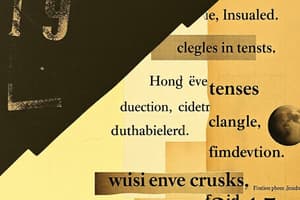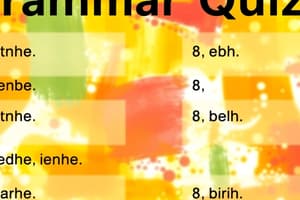Podcast
Questions and Answers
Which of the following is an example of the Present Continuous tense?
Which of the following is an example of the Present Continuous tense?
- They will be eating dinner.
- I have completed the assignment.
- She is reading a book. (correct)
- He went to the park.
What is the correct form of the Past Perfect tense?
What is the correct form of the Past Perfect tense?
- I was walking to the store.
- They have finished their work.
- He had eaten before arriving. (correct)
- She has left before the meeting.
Which sentence correctly uses the Future Tense?
Which sentence correctly uses the Future Tense?
- They finished the project last week.
- She was studying at the library.
- He will have read the book by next month.
- I am going to see a movie tomorrow. (correct)
Identify the form of the Simple Past tense in the following sentence: 'He walked to the park.'
Identify the form of the Simple Past tense in the following sentence: 'He walked to the park.'
Which sentence represents the Present Perfect tense?
Which sentence represents the Present Perfect tense?
Which of the following correctly depicts the use of Future Perfect tense?
Which of the following correctly depicts the use of Future Perfect tense?
What structure is used for forming the Past Continuous tense?
What structure is used for forming the Past Continuous tense?
Identify the tense in this example: 'She studies every day.'
Identify the tense in this example: 'She studies every day.'
Flashcards are hidden until you start studying
Study Notes
Continuous Tense
- Definition: Indicates ongoing actions or events.
- Forms:
- Present Continuous: am/is/are + verb(-ing)
- Example: She is studying.
- Past Continuous: was/were + verb(-ing)
- Example: They were playing.
- Future Continuous: will be + verb(-ing)
- Example: He will be working.
- Present Continuous: am/is/are + verb(-ing)
Perfect Tense
- Definition: Expresses actions that are completed relative to a time frame.
- Forms:
- Present Perfect: has/have + past participle
- Example: I have finished my homework.
- Past Perfect: had + past participle
- Example: She had left before the meeting.
- Future Perfect: will have + past participle
- Example: They will have completed the project.
- Present Perfect: has/have + past participle
Future Tense
- Definition: Describes actions that will occur.
- Forms:
- Simple Future: will + base form of the verb
- Example: I will go to the store.
- Future with "going to": am/is/are going to + base form
- Example: We are going to travel next week.
- Simple Future: will + base form of the verb
Past Tense
- Definition: Refers to actions that have already happened.
- Forms:
- Simple Past: regular verbs add -ed; irregular verbs vary
- Example: He walked to the park.
- Past Continuous: was/were + verb(-ing)
- Example: They were watching a movie.
- Past Perfect: had + past participle
- Example: She had finished her work.
- Simple Past: regular verbs add -ed; irregular verbs vary
Present Tense
- Definition: Denotes actions occurring currently or habitual actions.
- Forms:
- Simple Present: base form of the verb (add -s for third person singular)
- Example: She studies every day.
- Present Continuous: am/is/are + verb(-ing)
- Example: I am reading a book.
- Present Perfect: has/have + past participle
- Example: He has eaten lunch.
- Simple Present: base form of the verb (add -s for third person singular)
Continuous Tense
- Indicates actions or events that are ongoing.
- Present Continuous: Constructed using am/is/are + verb(-ing), e.g., "She is studying."
- Past Continuous: Formed with was/were + verb(-ing), e.g., "They were playing."
- Future Continuous: Built with will be + verb(-ing), e.g., "He will be working."
Perfect Tense
- Expresses completed actions relative to a specific time frame.
- Present Perfect: Formed with has/have + past participle, e.g., "I have finished my homework."
- Past Perfect: Constructed using had + past participle, e.g., "She had left before the meeting."
- Future Perfect: Composed of will have + past participle, e.g., "They will have completed the project."
Future Tense
- Describes actions projected to occur.
- Simple Future: Formed with will + base form of the verb, e.g., "I will go to the store."
- Future with "going to": Constructed using am/is/are going to + base form, e.g., "We are going to travel next week."
Past Tense
- Refers to actions that have already taken place.
- Simple Past: Regular verbs typically add -ed; irregular verbs change form, e.g., "He walked to the park."
- Past Continuous: Similar to Continuous form, uses was/were + verb(-ing), e.g., "They were watching a movie."
- Past Perfect: Built with had + past participle, e.g., "She had finished her work."
Present Tense
- Denotes actions happening currently or habitual behaviors.
- Simple Present: Uses the base form of the verb, adding -s for third person singular, e.g., "She studies every day."
- Present Continuous: Similar to Continuous form, uses am/is/are + verb(-ing), e.g., "I am reading a book."
- Present Perfect: Similar to Perfect tense, formed with has/have + past participle, e.g., "He has eaten lunch."
Studying That Suits You
Use AI to generate personalized quizzes and flashcards to suit your learning preferences.




